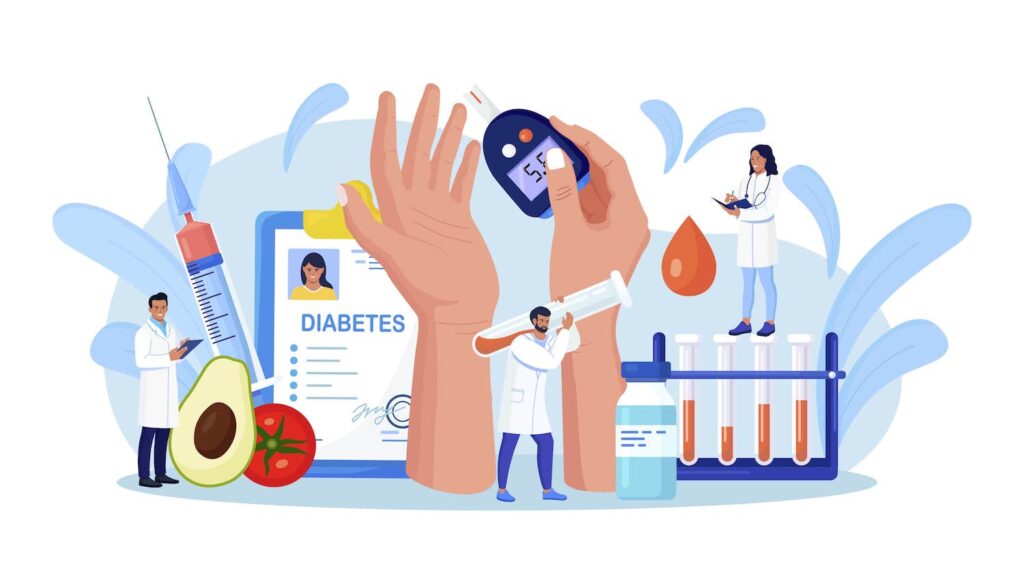Diabetes education and awareness for American Diabetes Alert Day, March 28, 2023.
THE PHARMACY PROFESSIONAL’S ROLE IN DIABETES MANAGEMENT
The American Diabetes Alert Day brings on a moment of reflection of the role that healthcare professionals have in the treatment of diabetes. Pharmacists were always involved in dispensing diabetes-related medications and educating patients and their caregivers about the proper use of these medications. There is a growing body of literature supporting the role of the pharmacist in diabetes care in a capacity that is beyond a dispensing role. Studies like the Asheville Project diabetes program and the Diabetes 10-City Challenge reported that intervention by pharmacists had a significant impact on glycemic control, blood pressure, lipid profile, and medical cost. Pharmacists have become an integral part of a team-based approach in diabetes management, whether it’s as a part of a rounding team in the inpatient hospital setting or ambulatory care setting. See our diabetes certification for pharmacists and technicians, Hands-on Diabetes.
Table of Contents
The team-based approach to diabetes management
As part of a team, pharmacists can help guide treatment decisions. They play a role in medication selection in diabetes therapy, especially since the increase in armamentarium of available medications in the treatment of diabetes. Medication therapy is evaluated for each patient by considering not only efficacy, but potential adverse effects, any potential food, drug, or herbal interactions, renal and liver function tests, and cost effectiveness, to name a few.
Pharmacists also consult patients to prevent diabetes complications and adverse effects, and to increase adherence to medication therapy. Interventions include recording and interpreting hemoglobin A1C, blood glucose levels, blood pressure, and lipid profile. In addition, a collaborative drug-therapy agreement with physicians delegates certain authority to pharmacists. This authority may include medication dose titration, or even the initiation of a new medication to improve glycemic control. In different settings where interdisciplinary diabetes management programs are practiced, pharmacists function as part of a multidisciplinary team to discuss lifestyle modifications, evaluate medication regimens, and overcome barriers to diabetes therapy.
The future of diabetes treatment and technology
As the world of diabetes changes and treatments and the technology surrounding glucose monitoring and insulin delivery devices advance, pharmacists find themselves in a race to learn about new medication therapies, new technology, and updated guidelines for disease management. To meet the demands of the changes in diabetes management, there is a need for hands-on, technical knowledge to advise both patients and healthcare professionals who may be struggling with new technology in medication delivery or glucose monitoring.
Injection technique may appear trivial but is crucial for the improvement of glycemic control. With the selection of an appropriate needle and the use of a proper injection technique, patients can prevent complications caused by improper injection techniques and can ensure the effective delivery of injectable medications.
With the availability of many glucometers on the market, patients and their caregiver may feel overwhelmed as to what glucometer to choose. With information about the highlights of each glucometer on the market, counseling can help direct patients to find a glucometer that meets their needs. From the dawn of glucose monitoring, patients were hoping for an easier, painless, non-invasive way to monitor and record glycemic control. This wish has been fulfilled with the introduction of continuous glucose monitors (CGM).
The role of pharmacists in managing continuous glucose monitors
With recent availability of CGM in the pharmacy, pharmacy professionals are entrusted with providing consultation on how to insert a sensor or interpret the data on a receiver or a phone. Pharmacists must be versed in the technical data of sensor application and data downloading and be able to evaluate the glycemic data that is downloaded.
The role of pharmacists is increasing in the initiation of CGM devices as well as monitoring and interpreting results. Interpreted glycemic patterns are used as a basis to evaluate diabetes therapy, modify medication therapy, or provide disease state management education.
Overcoming barriers with patient education in the pharmacy
In the area of disease management, patients may need to learn about how to overcome barriers. Because patients often have easier access to pharmacists than they do to other health care providers, barriers to diabetes management such as hypoglycemia and sick day management can be addressed before they occur through training in the pharmacy. Patients must be versed in administration techniques of new glucagon products, whether the product is inhaled or injected.
Training may also be provided to caregivers when the patient is not able to use glucagon products by themselves. Many patients seek relief for diabetes complications by turning to over-the-counter (OTC) products in the pharmacy. With regard to diabetes complications such as peripheral neuropathy, consultation goes beyond current prescribed medications for peripheral neuropathy to include OTC items and surgical supplies. Foot examination in a pharmacy provides a screening tool to prevent potential foot ulcers. Upon foot examination, pharmacists are able to recommend OTC products, ensure proper foot care and in some cases, act as a referral source for podiatrists.
The pharmacy technician’s role in diabetes management
Patient education is not limited to pharmacists. Pharmacy technicians also have an opportunity to participate in patient and caregiver education in different settings. As a practical approach to glucose monitoring devices and medication delivery devices is continuously entrusted to pharmacy staff, pharmacy technicians can play a role in educating patients and their caregivers on proper injection technique, appropriate needle selection for injectable items, glucometer use techniques, and CGM sensor and reader or receiver initiation.
They can also assist pharmacists in gathering information from patients and providing information about OTC products. Adherence to medication therapy is also an area that can be monitored and recorded by pharmacy technicians, either when a medication refill order is placed or when injection technique demonstration is reviewed.
Hands on, practical diabetes management training through freeCE
Diabetes is a chronic disease that can be overwhelming to patients and their caregivers. Pharmacists and pharmacy technicians in community, hospital, and primary care settings can be a key resource. Pharmacy professionals can participate as part of a multidisciplinary team model to improve the medication management of patients with diabetes. Pharmacists in community and primary care settings can be easily accessible to assist patients, caregivers, and other healthcare professionals to solve problems related to diabetes therapy.
To gain the confidence of other health care providers and patients, pharmacists and pharmacy technicians must develop a technical, hands-on, and practical approach to managing diabetes. This type of care focuses on managing medications to positively impact health outcomes, reduce overall healthcare system costs, and empower patients to actively manage their health.
For a self-paced course to help you master this approach, check out Hands-on Diabetes: A Practical Way to Manage Diabetes.







